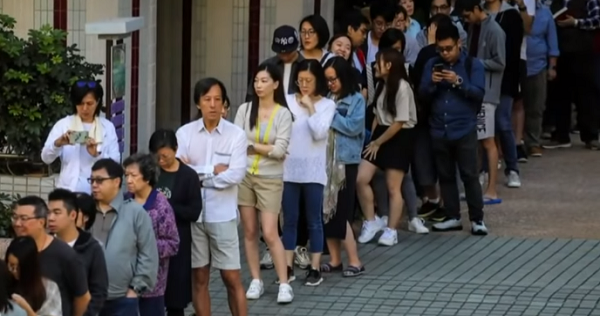
Hong Kong residents wait with anticipation to vote in the most important election in the history of the territory.
After months of grueling protests escalating into chaotic spasms of raw street violence, the former crown colony of Hong Kong, currently at the precarious intersection in hosting a clash between a revolt and the ancient guerrilla political tactics employed by Beijing, may have finally reached a temporary onset of stability. And the robust economic talon of the ominous dragon, can thank the populace for allowing their voices to be collectively heard.
Prompted by three tedious decades of volatility, and the abject failure of the British government to dutifully vacate the territory in a manner conducive to the continued adherence to free market principles, citizens and entrepreneurs caught up in the riptide of ideological ambiguity visited the voting booths last week with rampart enthusiasm illustrated by record numbers. The result, incumbent lawmakers representing the interests of the government and the party are in the process of being replaced by pro-democracy candidates hoping to remove the chains of servitude on the present and future standing of Hong Kong’s economy, allowing residents that strive hold onto the dream of once again existing in the free world. The nightmarish inclinations of Deng’s “One country, two systems” policy eliciting pure horror, and leading directly to the stark transformation of the world renowned pure capitalistic entity into a hybrid ingrate of corruption and bureaucratic intervention, may now be finally be subdued, if not overcome by the orchestrated zeal of impassioned activists exercising their limited rights.
The majority of ballots counted in the election for the ages as of Friday suggests a probable full-scale turnover at all levels of government, as candidates representing traditional Chinese ideology, were being thoroughly defeated, with the final results still pending. In all, the democratic candidates had prevailed in 269 of the 452 races, the unlikelihood bordering on the surreal and a complete antithesis from the most recent stretch of disappointing elections.
With the astounding 71% turnout at the polls, the numbers lean heavily towards a new breed of politician willing to battle the iron clad will of empire and sending a statement resounding across the globe. As a growing trend of democratic candidates systematically procure previously untouchable seats, the 7,3 million residents of the colony can be cautiously optimistic that a positive resolution will finally arrive 31 years overdue after the British unceremoniously and inexplicably handed the fortunes of a burgeoning economic zone and its people on a platter to the ruling class overseeing the ancient burdens of the Forbidden city. The remnants of the once isolated fiscal treasure group of islands forged by the romantic legends of smugglers and tycoons scheduled for reallocation as detritus, to be dispersed among the remaining billions united through fear and reeducation campaigns, rather than the cohesive channels of individual liberties, accomplishments, and grace.
With the presence of relentless civil internecine and the polling place atmosphere of intrigue, the outliers of the tech realm even played a small and vital role in sparking the effective revolution and promoting voter turnout, in providing a global audience with front row seats to the disturbing magnitude of violence and frequency of heated encounters within the skyscraper corridors of downtown Hong Kong. Software developers were able to program and release a smartphone app, built of the specific purpose of providing the public with crucial knowledge and transparency. The software mapping platform of HKmap.live went live in late October, and with detailed street displays alerting users to interactions between police and protesters, downloads went viral for residents and those around the world with a vested interest as to the fate of the people literally fighting for their rights. Curiously, Apple temporarily removed the app from its digital storefront in an apparent strategic olive branch gesture towards Beijing, before retracting the decision amid heavy scrutiny.
However, the temporary success in the aftermath of the enduring sacrifices of Hong Kong residents may be a reusable template for the unfortunate citizens of rogue regimes in attaining basic freedoms through the simple act of dedication along with a high voter turnout. Thanks to the tech world, the days of complete subversion are a thing of the past, and militant governments can be ensured that support for those being exploited is now global, thanks to the prevalence of smart devices, online communities, and innovative programming methods.
Under the vast HD surveillance camera network node of hundreds of millions of facial recognition technology monitored by Chinese intelligence and the People’s Liberation Army, the Hong Kong residents who made the conscious decision to openly call for reform despite the reality of potentially being labeled as dissenters and thus eligible for forced labor camp or worse, should inspire individuals and groups in similar unsavory and insufferable quandaries that organized public action is a tonic against totalitarianism. To the rest of the planet, a limited dose of tech here and there prevents stagnation, unless the instant gratification addicts of the social networks decide that memes and selfies prove as the architects in brandishing accountability or preserving functioning democracies. When it is all said and done it boils done to exercising the right to vote, as actions speak louder than words, or digital thoughts in a limited amount of characters.